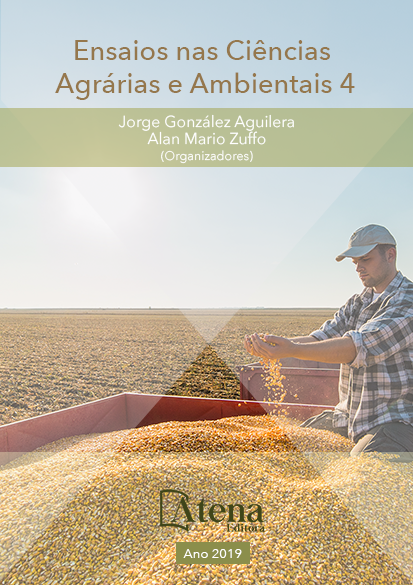
SUPRESSÃO DO BIOMA MATA ATLÂNTICA NO MUNICÍPIO DE PARAÍBA DO SUL-RJ, ANALISADO SOB A ÓPTICA AMBIENTAL E SOCIAL, ENTRE OS ANOS 2002 A 2012
O Brasil é um país que detêm
ampla abundância de biomas, dentre eles,
a Mata Atlântica, ambiente costeiro a leste,
considerado um acervo ecológico nacional.
Inicialmente, este bioma abrangia toda a costa
brasileira, mas a pressão antrópica relacionada
ao extrativismo vegetal, crescimento urbano e
aumento de áreas utilizadas para agropecuária,
reduziram este bioma à, aproximadamente,
8,5% de sua composição original. O presente
trabalho disponibiliza o levantamento de dados,
em relação aos possíveis desmatamentos que
ocorreram no município de Paraíba do Sul,
estado do Rio de Janeiro, entre os anos de 2002
à 2012, interpretando-os sob a ótica ambiental
(queimadas, desmatamentos, poluição hídrica
e poluição atmosférica) e socioeconômica
(densidade populacional e IDH), utilizando
de fontes públicas disponíveis na internet:
sites do Ministério do Meio Ambiente/Instituto
Brasileiro do Meio Ambiente (MMA/IBAMA);
Organização não-governamental (ONG) SOS
Mata Atlântica; Departamento Nacional de
Trânsito (DENATRAN); Instituto Nacional de
Pesquisas Espaciais (INPE); Instituto Brasileiro
de Geografia e Estatística (IBGE) e no portal do
Departamento de Informática do Sistema Único
de Saúde (DATASUS). O objetivo foi gerar
arcabouço técnico em pósteras elaborações
de políticas públicas no que tange ao meio
ambiente local. Os dados indicaram uma
supressão de 0,01% da mata no município
no período supracitado, culminando com um
pequeno aumento demográfico. Apesar desse
pequeno acréscimo populacional, os moradores
despejaram, de forma significativa, mais de 30
mil m³ de esgoto “in natura” no rio Paraíba do
Sul, além da contribuição direta de poluição
atmosférica por fontes móveis, que dobraram
nesta localidade no espaço de uma década.
SUPRESSÃO DO BIOMA MATA ATLÂNTICA NO MUNICÍPIO DE PARAÍBA DO SUL-RJ, ANALISADO SOB A ÓPTICA AMBIENTAL E SOCIAL, ENTRE OS ANOS 2002 A 2012
-
DOI: 10.22533/at.ed.40719160110
-
Palavras-chave: Queimadas; Desenvolvimento Humano; Desmatamento
-
Keywords: Brazil is recognized to be a Country that pursue abundancy in biomes Ensaios nas Ciências Agrárias e Ambientais 4 Capítulo 10 96 such as the Atlantic forest positioned in the East coastal landscape that pursue a rich ecological collection. In the past times this biome covered the entire Brazilian coast but the anthropic action through plant extractivism, urban growth, and the increment of areas dedicated to farming were crucial to reduce it to 8.5% of its original composition. This study will present data collection from possible deforestation events occurred in Paraíba do Sul municipality, Rio de Janeiro State between 2002 and 2012 that were interpreted under the environmental view (forest burning, deforestation, both water and air pollution) and socioeconomic view (population density and HDI – human density index). All this material was collected in public websites as Ministry of Environment/ Brazilian Environment Institute (MMA/IBAMA), SOS Atlantic Forest NGO Organization; National Car Transit Department (DENATRAN), Space Research National Institute (INPE), Geography and Statistics Brazilian Institute (IBGE) and Unified Health System data processing portal (DATASUS). The objective was to generate technical framework to help elaboration of future public policies regarding local environment matters. The results indicated suppression of 0.01% of forest in the period aforementioned and a small population growth. Despite this small increase residents disposed more than 30.000m3 of in natura sewage water in Paraíba do Sul River and contributed also to atmospheric pollution due to motor vehicle resources that doubled in this area in a decade period.
-
Abstract:
Brazil is recognized to be a
Country that pursue abundancy in biomes
such as the Atlantic forest positioned in the East coastal landscape that pursue a rich
ecological collection. In the past times this biome covered the entire Brazilian coast
but the anthropic action through plant extractivism, urban growth, and the increment of
areas dedicated to farming were crucial to reduce it to 8.5% of its original composition.
This study will present data collection from possible deforestation events occurred in
Paraíba do Sul municipality, Rio de Janeiro State between 2002 and 2012 that were
interpreted under the environmental view (forest burning, deforestation, both water and
air pollution) and socioeconomic view (population density and HDI – human density
index). All this material was collected in public websites as Ministry of Environment/
Brazilian Environment Institute (MMA/IBAMA), SOS Atlantic Forest NGO Organization;
National Car Transit Department (DENATRAN), Space Research National Institute
(INPE), Geography and Statistics Brazilian Institute (IBGE) and Unified Health System
data processing portal (DATASUS). The objective was to generate technical framework
to help elaboration of future public policies regarding local environment matters. The
results indicated suppression of 0.01% of forest in the period aforementioned and a
small population growth. Despite this small increase residents disposed more than
30.000m3 of in natura sewage water in Paraíba do Sul River and contributed also to
atmospheric pollution due to motor vehicle resources that doubled in this area in a
decade period.
-
Número de páginas: 15
- Luan Silva Alves Bastos


